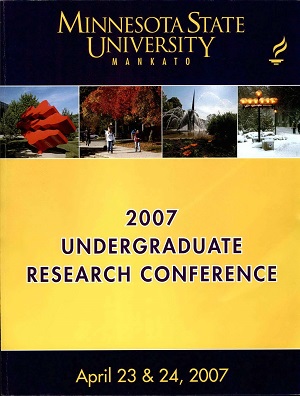An Ethical Debate: Measuring Truthiness In Parliamentary Debate
Location
CSU 201
Start Date
23-4-2007 1:00 PM
End Date
23-4-2007 2:30 PM
Student's Major
Communication Studies
Student's College
Arts and Humanities
Mentor's Name
James Dimock
Mentor's Department
Communication Studies
Mentor's College
Arts and Humanities
Description
The practice of competitive debate has, since Ancient Greece, been justified as a way of developing critical thinking, public speaking and civic understanding and the National Parliamentary Debate Association (NPDA) embraces that vision of debate. Founded in 1992, the NPDA strives to promote eivic engagement, leadership and the development of argumentation and public speaking skills through competition in organized, intercollegiate debates. Central to the NPDA's mission is the belief speakers should be able to debate extemporaneously, without reliance on evidence and files, about a wide variety of subjects and thus in addition to other benefits of debate, it encourages student competitors to be informed and knowledgeable on a wide variety of topics. As Rutledge (2002) has observed, however, the educational foundation of parliamentary debate is threatened by lying. If student competitors do not know about current events but actually only claims to know, then parliamentary debate not only has no educational value but also actually teaches people how to lie, trick and deceive, practices, which do not support democracy but actually threaten it. Our research answered Rutledge's call to see if lying is rampant in the NPDA. This would test the viability of NPDA debate as an educational tool.
An Ethical Debate: Measuring Truthiness In Parliamentary Debate
CSU 201
The practice of competitive debate has, since Ancient Greece, been justified as a way of developing critical thinking, public speaking and civic understanding and the National Parliamentary Debate Association (NPDA) embraces that vision of debate. Founded in 1992, the NPDA strives to promote eivic engagement, leadership and the development of argumentation and public speaking skills through competition in organized, intercollegiate debates. Central to the NPDA's mission is the belief speakers should be able to debate extemporaneously, without reliance on evidence and files, about a wide variety of subjects and thus in addition to other benefits of debate, it encourages student competitors to be informed and knowledgeable on a wide variety of topics. As Rutledge (2002) has observed, however, the educational foundation of parliamentary debate is threatened by lying. If student competitors do not know about current events but actually only claims to know, then parliamentary debate not only has no educational value but also actually teaches people how to lie, trick and deceive, practices, which do not support democracy but actually threaten it. Our research answered Rutledge's call to see if lying is rampant in the NPDA. This would test the viability of NPDA debate as an educational tool.
Recommended Citation
Randall, Joshua and David Brennan. "An Ethical Debate: Measuring Truthiness In Parliamentary Debate." Undergraduate Research Symposium, Mankato, MN, April 23, 2007.
https://cornerstone.lib.mnsu.edu/urs/2007/oral-session-06/4




